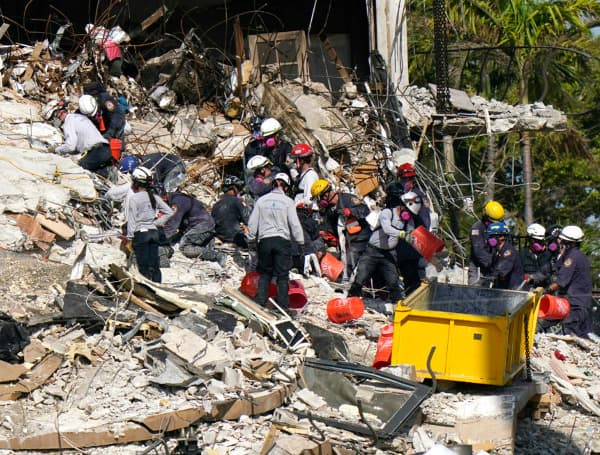Nearly a year after 98 people died in the collapse of the Champlain Towers South building in Surfside, Florida lawmakers Tuesday released a proposal that would lead to new condominium inspection and financial requirements.
The House and Senate added the issue to a special legislative session that Gov. Ron DeSantis called to address problems in the property-insurance market. Lawmakers could not reach agreement during this year’s regular session on the condominium issue, despite pressure after the June collapse of the Surfside building.
House Speaker Chris Sprowls, R-Palm Harbor, acknowledged “a lot of criticism” about lawmakers not passing a condominium bill during the regular session. But he said the new proposal, which could pass Wednesday, is an improvement over what was considered earlier.
“Doing the right thing sometimes is hard and it’s complicated, but I do think that the bill that we have today is significantly better than the bill we could have agreed on a couple months ago,” Sprowls said.
The House Appropriations Committee was scheduled Tuesday night to take up the 101-page House bill. Meanwhile, the Senate appeared ready to consider tacking the issue onto an already-filed property insurance bill.
The proposal, in part, would set up a system of required inspections for condominium buildings three stories or higher. Inspections would be required for buildings that have been occupied for 30 years — or 25 years if the buildings are within three miles of a coastline. After initial inspections, the buildings would have to go through the process every 10 years.
If engineers or architects see “any substantial structural deterioration” in initial inspections, the proposal would require additional inspections. Those inspections “may be as extensive or as limited as necessary to fully assess areas of structural distress in order to confirm that the building is structurally sound and safe for its intended use and to recommend a program for fully assessing and repairing distressed and damaged portions of the building,” the proposal said.
Inspection reports would have to be provided to condominium associations and local building officials. Summaries of the reports would have to be distributed to condominium unit owners.
Also, under the proposal, county commissions “may” pass ordinances that would require condominium associations to move forward with repairs for structural deterioration.
A key issue during the regular legislative session involved condominium-association reserve funds to make repairs to buildings. The issue is difficult, at least in part, because it can require condominium residents to pay extra money to bolster reserves.
The new proposal would require what are described as “structural integrity reserve” studies that would help determine how much money would need to be set aside.
Sprowls said the issue has been crucial to the House.
“It was important to the House that if there’s a structural integrity issue for a building, that people do what’s necessary to defend the people who live there, to protect (them) by making sure they fix it, put the dollars aside to fix it,” he said.
Senate Community Affairs Chairwoman Jennifer Bradley, a Fleming Island Republican who has spearheaded the condominium issue in the Senate, pointed toward trying to strike a balance.
“As we have continued to work on this important issue, I believe we have found the right balance between requiring critical protections to ensure the structural integrity of condo buildings and allowing for the (association) boards to manage funds paid by homeowners,” Bradley said in a prepared statement.
Visit Tampafp.com for Politics, Tampa Area Local News, Sports, and National Headlines. Support journalism by clicking here to our GiveSendGo or sign up for our free newsletter by clicking here.
Android Users, Click Here To Download The Free Press App And Never Miss A Story. Follow Us On Facebook Here Or Twitter Here.
Copyright 2022 The Free Press, LLC, tampafp.com. All rights reserved. This material may not be published, broadcast, rewritten, or redistributed.

